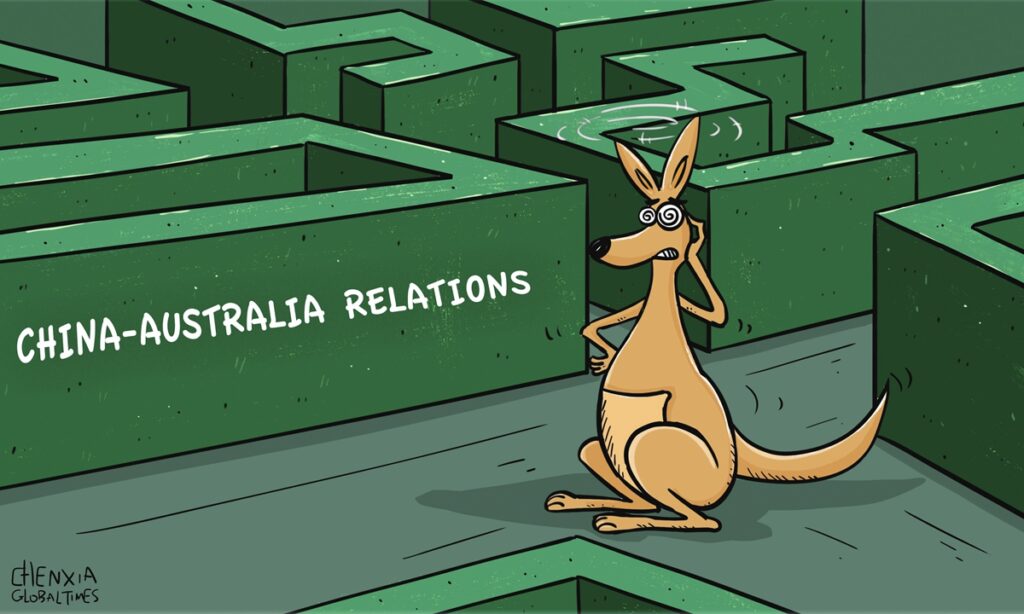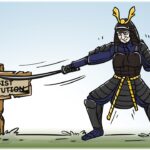A new research based on two surveys of 1,003 adults living in Australia and 1,002 adults living in the island of Taiwan, respectively, from the Australia Institute, an Australian independent think tank, shows an “astonishing” result that nearly one in 10 Australians think China “will attack Australia soon,” while just one in 20 people in Taiwan agree with that.
This new research comes after another Lowy survey report issued late in June which found that the vast majority of Australians say China will soon pose as a military threat to their country, another evidence that the perception of Australians toward China is now seriously skewed.
Since 2017, Australia has begun an anti-China wave to mislead the Australian people with a serious China threat theory. Chen Hong, president of the Chinese Association of Australian Studies and director of the Australian Studies Centre at East China Normal University, told the Global Times that this is actually not surprising given the almost daily frenzied smear attacks on China in various Australian media, and the constant China rumor mongering by some anti-China politicians. In particular, the policies and rhetoric during the Morrison administration have had a more damaging impact on China-Australia relations than any other Australian government, and are rarely seen in the history of Australian diplomacy.
In addition, the research indicates that nearly one in four Australians think that China will attack Taiwan soon, while merely one in 20 people in Taiwan think that China will do so. This mirrors that the Australians people’s cognition on multiple sensitive issues including the Taiwan question is more seriously distorted by Australian media, academia and politicians in various ways. Instead, the people in Taiwan who have a better understanding of the actual situation are even closer to reality in this regard.
The attitudes of Australians toward China also show significant differences by age. Younger Australians are more likely to think that China will “attack Australia” than older Australians, with 60 percent of them aged 18-29 thinking China will attack soon or sometime compared to 41 percent of those aged 60 or older. Chen believes that this is related to young people using social media more frequently and thus being more exposed to negative reports on China.
There has been a huge reduction in bilateral people-to-people exchanges between China and Australia since the outbreak of COVID-19 pandemic, leading Australians to heavily rely upon domestic media to get information about China. Older people, on the other hand, have been relatively less affected by the misinformation spread at home about China these years due to their past experience, real-life interactions with their Chinese colleagues and friends, and the basic understanding of China.
This is a worrying signal. There will undoubtedly be large quantities of young people who will work in international scenario related industries in the future. With such misunderstandings that is rare even in other Western countries, these young Australians will probably be a hidden danger for future bilateral cooperation.
Anti-China forces in Australia are not only distorting people’s perception toward China, but its anti-China intelligence services are also misleading policy makers. Chen noted that a typical anti-China process is that the intelligence department often takes the initiative to “feed” the media with information that is not evidence-based, often to young journalists who are eager to build their careers. They are always ecstatic to report such “news” being “confirmed” by some so-called experts in certain anti-China think thanks, say, the Australian Strategic Policy Institute.
In the long run, surveys among people who are used to reading such reports is bound to have astonishing results with wrong perceptions of China. The concern is whether some anti-China politicians will use these “public opinions” molded and shaped by themselves as “evidence” to promote anti-China bills by hyping the fears of Australians about China’s “invasion.”
Nevertheless, professor David Goodman, director of the China Studies Centre at the University of Sydney, pointed out that the results are more about the saber-rattling of irresponsible politicians than real risk assessment.
In any case, Canberra should actively change its dysfunctional status quo of public opinion at home and report objectively on China based on international reality. At the end of the day, false reports cannot manipulate politics for long. As Abraham Lincoln said, you can fool all the people some of the time and some of the people all the time, but you cannot fool all the people all the time.
(Global Times)




